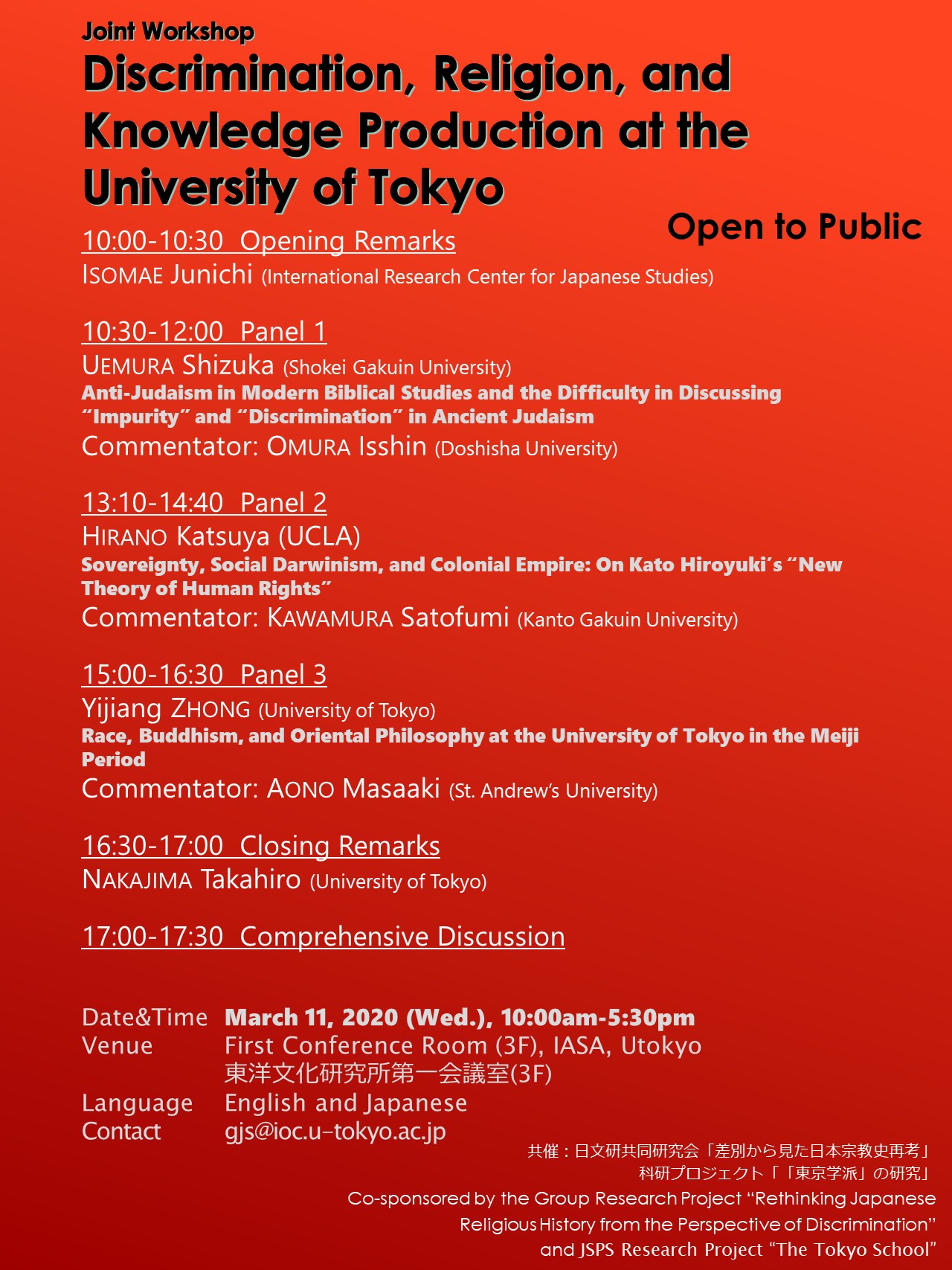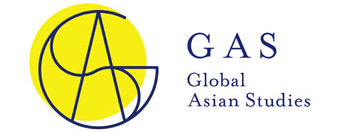「東京学派」ワークショップ[中止] Discrimination, Religion, and Knowledge Production at the University of Tokyo
| 日時: | |
|---|---|
| 会場: | 東京大学東洋文化研究所 第一会議室(3階) |
| 発表者: | 磯前順一(国際日本文化研究センター教授) 上村静(尚絅学院大学教授) 大村一真(同志社大学博士課程大学院生) 平野克弥(カリフォルニア大学ロサンゼルス校准教授) 川村覚文(関東学院大学講師) 鍾以江(東京大学東洋文化研究所准教授) 青野正明(桃山学院大学教授) 中島隆博(東京大学東洋文化研究所教授) |
| 使用言語: | 英語・日本語 |

プログラム: アブストラクト:
新型コロナウィルスに関する現状に鑑み、大変残念ながら本イベントを中止することにいたしました。ご参加をご検討くださいました皆様に心よりお詫び申し上げます。状況が落ち着けばあらためて開催することを予定しておりますので、日程が決まり次第、再度ウェブサイトにてご連絡いたします。ご理解のほど、どうぞよろしくお願い申し上げます。
10:00-10:30 Opening Remarks (ISOMAE Junichi, International Research Center for Japanese Studies)
10:30-12:00 Panel 1
UEMURA Shizuka (Shokei Gakuin University)
Anti-Judaism in Modern Biblical Studies and the Difficulty in Discussing "Impurity" and "Discrimination" in Ancient Judaism
Commentator: OMURA Kazuma (Doshisha University)
12:00-13:10 Lunch
13:10-14:40 Panel 2
HIRANO Katsuya (UCLA)
Sovereignty, Social Darwinism, and Colonial Empire: On Kato Hiroyuki's "New Theory of Human Rights"
Commentator: KAWAMURA Satofumi (Kanto Gakuin University)
14:40-15:00 Coffee Break
15:00-16:30 Panel 3
Yijiang ZHONG (University of Tokyo)
Race, Buddhism, and Oriental Philosophy at the University of Tokyo in the Meiji Period
Commentator: AONO Masaaki (St. Andrew’s University)
16:30-17:00 Closing Remarks (NAKAJIKA Takahiro, University of Tokyo)
17:00-17:30 Comprehensive Discussion
UEMURA Shizuka (Shokei Gakuin University)
Anti-Judaism in Modern Biblical Studies and the Difficulty in Discussing "Impurity" and "Discrimination" in Ancient Judaism
The Old Testament, which is called Tanakh, Miqra or Hebrew Bible by Jews and the one and only Bible for Jews, is a part of the Christian Bible. The term "Old," contrasted to the "New," connotes "invalid" and "finished." The Christian Church, therefore, has regarded Judaism as invalid and finished from the late first century CE on; a view which has legitimatized Christian anti-Judaism. Modern biblical studies, which have led mainly by the Western Protestant scholars, have renewed the anti-Judaism by their historico-critical, and so objective-like, researches.
The modern Old Testament studies have begun with the notion that the Prophets were earlier than the Pentateuch (the five Books of Moses, the Mosaic Laws or the Torah, the Holiest Scriptures for the Jews). This "academic" result has recreated a Christian theology that the Prophets represented the true religion which, distorted by the Jews into the legalistic religion, was succeeded by the Christianity; so Judaism must have been superseded by the Christianity (supersessionism or the Replacement Theology). In German of the 19th century and the first half of the 20th century the post-biblical Judaism (c. 200 BCE-100 CE) in which the Christian movements emerged was called "Spätjudentum," the late Judaism; a religion which should have been soon finished.
After the World War II when the tragedy of Holocaust was known to the Westerns, Christian scholars have become aware that their theology was a root of the anti-Semitism of the West. They have criticized the supersessionism and come to avoid issues which might involve anti-Semitism and anti-Judaism. Nevertheless, the Old Testament Scholars still tend to research the older, i.e., truer Prophetic, traditions and less the final and present, i.e., Jewish form of the Pentateuch; and the New Testament scholars favor describing conflicts between Jesus and his contemporary Jews, or those between St. Paul and his contemporary Judaism. In the biblical studies there still remains, unconsciously, the anti-Judaism symbolized by the term "Old Testament."
HIRANO Katsuya (UCLA)
Sovereignty, Social Darwinism, and Colonial Empire: On Kato Hiroyuki's "New Theory of Human Rights"
The talk will take a close look at Kato Hiroyuki's "New Theory of Human Rights" as a thesis that provided an ideological rationale for Japanese colonial projects. Central to this exegesis is an examination of the ways in which Kato presented the concepts of sovereignty, evolutionism, and colonial domination as the axes of history-as-movement. Instead of taking Kato as a net importer of western – mostly German – thought, the talk will examine Kato as a thinker who offered the Meiji State an ideological doctrine of his own.
Yijiang ZHONG (University of Tokyo)
Race, Buddhism, and Oriental Philosophy at the University of Tokyo in the Meiji Period
Upon returning from six-year study in Europe, Inoue Tetsujiro took up the professorship of philosophy at the University of Tokyo in 1890. In the 1890s, he lectured on history of Indian philosophy and Buddhism. One of the lectures examined the racial identity of Shakyamuni Buddha. Why did Inoue need to find out what race the Buddha is? What was the relationship between race, Buddhism, and Oriental philosophy the founding of which was attributed to Inoue? I will look into Inoue's lecture in the context of contemporary European Oriental Studies and their adoption in the Meiji period, and try to illustrate some of the ways in which the discriminatory taxonomy of modern knowledge production was negotiated and reproduced in Meiji Japan.
共催: 日文研共同研究会「差別から見た日本宗教史再考」・科研費基盤研究(B)「東京学派の研究」



